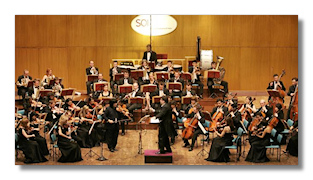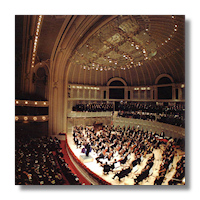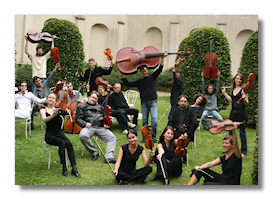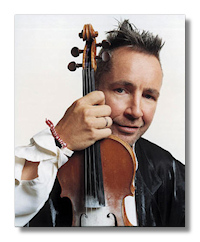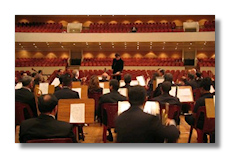
In Iraq, the Symphony Orchestra Plays On
By Melik Kaylan
Karim Wasfi, age 36, arrives driving a white Range Rover and dressed in a blazer, vest and ascot. Sporting aviator shades, his ample form topped by lush black hair, he could be one of the Three Tenors – or a staunchly civilized orchestra director, which is, in fact, what he is. When orchestra directors go around the streets of Baghdad looking exactly as they should, you know that things are bucking up. Except that Mr. Wasfi has held that post at the Iraq National Symphony Orchestra since 2004, through the darkest of times, and he has always looked like this. We set off at speed out of Mansour toward downtown Baghdad listening to Wagner. "The Ride of the Valkyries" to be precise.
"In the car, I also listen to the Saint-Saëns requiem and the Mozart requiem – that's usually the right mood for Baghdad," says Mr. Wasfi, in his cultivated English, as the checkpoint militias gape incredulously and wave us on. He has lost count of the times he has just missed being caught in a bomb blast or a firefight. "I vary my route to work – which I think may be more dangerous. In '06 I had to leave town and disappear for six months for my safety, but we still kept going – I organized two concerts from afar. . . . At one point, I had to tactfully get a formal religious proclamation from a top cleric that music was not profane. That took care of one group only. Still, these days, it's certainly better than it was – I'm trying to up the concerts to twice a month, but that includes a lot of chamber performances which I initiated some months ago," he says.
"At the very least, the audience must know for sure that somewhere in the city there will be a concert on the last Saturday of every month," says Mr. Wasfi, who is also co-conductor with Mohammed Amin Ezzat. "Then we give out the location in the last moment, for security. We do it by email, word-of-mouth, phone calls – I tell everyone I know. Even then, many hundreds turn up, depending on the place. That's our problem: We don't have a regular home. Well . . . one of our problems."
Read more about this at the Wall Street Journal website:















